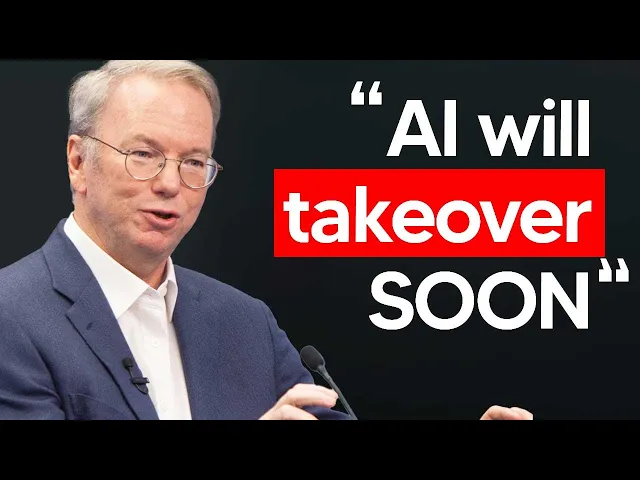Ex-Google CEO’s 2026 Warning: AI Will Be Smarter & Uncontrollable

Ex-Google CEO’s 2026 warning: AI will be smarter & uncontrollable
Former Google CEO Dr. Eric Schmidt recently shared some eye-opening predictions about artificial intelligence that should make us all sit up and pay attention. Speaking at the Special Competitive Studies Project, Schmidt suggested that we’re drastically underestimating how quickly AI is evolving toward superhuman capabilities.
AI is underhyped, not overhyped
While many tech observers complain about AI hype, Schmidt argues the opposite: we’re not taking the implications seriously enough. Why? Because we’re potentially just six years away from artificial superintelligence (ASI) – systems smarter than the collective intelligence of all humans combined.
“This path is not understood in our society. There’s no language for what happens with the arrival of this,” Schmidt warned. “This is happening faster than our human society, our democracy, our laws will address.”
The coming AI revolution in programming
One of Schmidt’s most striking predictions concerns the future of programming. Within just one year, he believes AI will be writing nearly all code. This isn’t just Schmidt’s view – Dario Amodei of Anthropic made similar predictions, suggesting we’re only 3-6 months away from AI writing 90% of code, and within 12 months, “AI may be writing essentially all of the code.”
But what happens next is even more fascinating. Schmidt points to something called “recursive self-improvement,” where AI systems begin improving themselves without human intervention. Major AI labs already report that 10-20% of their code is being generated by their own AI systems.
The San Francisco consensus: AGI by 2026-2028
What Schmidt calls the “San Francisco consensus” suggests we’ll achieve artificial general intelligence (AGI) within 3-5 years – systems as smart as the brightest humans across multiple domains simultaneously.
“What happens when every single one of us has the equivalent of the smartest human on every problem in our pocket?” Schmidt asked. ”
Recent Videos
How To Earn MONEY With Images (No Bullsh*t)
Smart earnings from your image collection In today's digital economy, passive income streams have become increasingly accessible to creators with various skill sets. A recent YouTube video cuts through the hype to explore legitimate ways photographers, designers, and even casual smartphone users can monetize their image collections. The strategies outlined don't rely on unrealistic promises or complicated schemes—instead, they focus on established marketplaces with proven revenue potential for image creators. Key Points Stock photography platforms like Shutterstock, Adobe Stock, and Getty Images remain viable income sources when you understand their specific requirements and optimize your submissions accordingly. Specialized marketplaces focusing...
Oct 3, 2025New SHAPE SHIFTING AI Robot Is Freaking People Out
Liquid robots will change everything In the quiet labs of Carnegie Mellon University, scientists have created something that feels plucked from science fiction—a magnetic slime robot that can transform between liquid and solid states, slipping through tight spaces before reassembling on the other side. This technology, showcased in a recent YouTube video, represents a significant leap beyond traditional robotics into a realm where machines mimic not just animal movements, but their fundamental physical properties. While the internet might be buzzing with dystopian concerns about "shape-shifting terminators," the reality offers far more promising applications that could revolutionize medicine, rescue operations, and...
Oct 3, 2025How To Do Homeless AI Tiktok Trend (Tiktok Homeless AI Tutorial)
AI homeless trend raises ethical concerns In an era where social media trends evolve faster than we can comprehend them, TikTok's "homeless AI" trend has sparked both creative engagement and serious ethical questions. The trend, which involves using AI to transform ordinary photos into images depicting homelessness, has rapidly gained traction across the platform, with creators eagerly jumping on board to showcase their digital transformations. While the technical process is relatively straightforward, the implications of digitally "becoming homeless" for entertainment deserve careful consideration. The video tutorial provides a step-by-step guide on creating these AI-generated images, explaining how users can transform...
